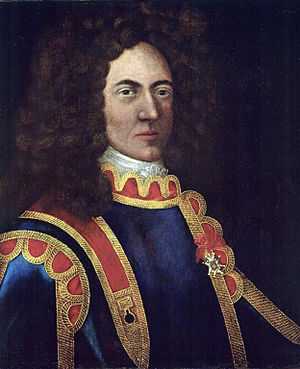Jean-Baptiste Hertel de Rouville
| Jean-Baptiste Hertel de Rouville | |
|---|---|
 Jean-Baptiste Hertel de Rouville | |
| Born |
October 26, 1668 Trois-Rivières, New France |
| Died |
June 30, 1722 (aged 53) Fort Dauphin, Île-Royale (New France) |
| Allegiance |
|
| Years of service | 1676-1722 |
| Battles/wars |
|
| Awards | Order of Saint Louis |
Jean-Baptiste Hertel de Rouville (26 October 1668 – 30 June 1722) was a colonial military officer of New France in the Compagnies Franches de la Marine. He is best known in North America for leading the raid on Deerfield, Province of Massachusetts Bay against English settlers on 29 February 1704. A dedicated soldier, he was widely reviled by the settlers of New England for his tactics of raiding poorly defended settlements. During Queen Anne's War he also participated in military operations against the English in Newfoundland, and he played a role in the early settlement of Île-Royale (present-day Cape Breton Island), after that war.
King William's War
Hertel de Rouville was born into a military family in Trois-Rivières, in the colony of Canada, New France. Active in the troupes de la marine from an early age, he served with his father during a 1687 French military operation against the Seneca tribes of present-day western New York led by Governor of New France Jacques-René de Brisay de Denonville, Marquis de Denonville.
During King William's War, Hertel was among the defenders during the 1690 Battle of Quebec. He was granted the seignory of Rouville at Mont Saint-Hilaire in 1694. [1]
Queen Anne's War
During Queen Anne's War, Hertel led his first significant independent expedition, the Raid on Deerfield (1704). At the head of a force mainly of Abenaki and Iroquois warriors, but also a company of Canadian militia, he took the men south to the English Province of Massachusetts Bay and descended on the lightly defended frontier town of Deerfield in late February. The raiders achieved surprise, killing 54 settlers and taking more than 100 prisoners. The prisoners, including women and children, were taken on the long overland trek to Quebec, where many were adopted by Catholic Mohawk at Kahnawake, near Montreal.
Hertel de Rouville was sent to Newfoundland later in 1704, where he participated in offensive operations against St. John's and other English communities. In 1708 he was at the head of an expedition with ambitious goals that was reduced to a single raid on Haverhill, Massachusetts by a lack of Indian support. For the rest of Queen Anne's War, he continued to lead similar raiding operations, leading one of English opponents to describe him as "an officer of great courage, but pre-eminently cruel and vindictive."
Île-Royale
After Queen Anne's War ended in 1713, Hertel de Rouville was sent to Île-Royale (present-day Cape Breton Island) to scout sites for new French settlements. Based on his recommendations, Fort Dauphin (present-day Englishtown, Nova Scotia) was selected for an initial settlement, and Hertel de Rouville oversaw its construction. He was awarded the Order of Saint Louis in 1721, and died on Île-Royale while serving as commandant of Fort Dauphin.
He was twice married. He had two sons who distinguished themselves in military service to New France.
References
- ↑ Charlotte Gray 'The Museum Called Canada: 25 Rooms of Wonder' Random House, 2004
- "Jean-Baptiste Hertel de Rouville". Dictionary of Canadian Biography (online ed.). University of Toronto Press. 1979–2005.
_A_new_and_accurate_map_of_the_English_empire_in_North_America%2C_1755.png)